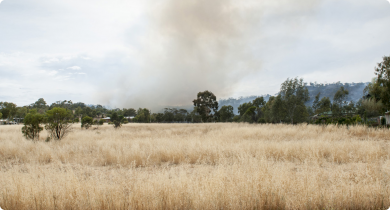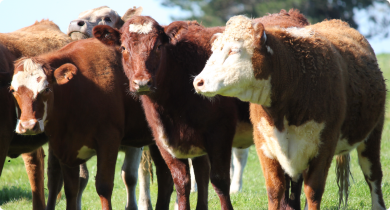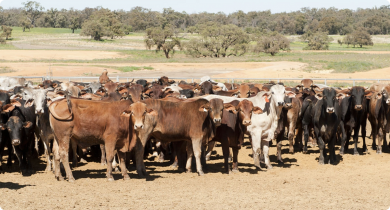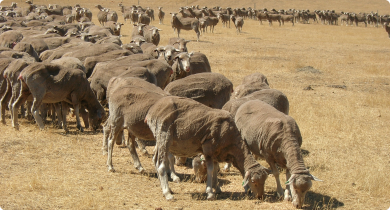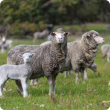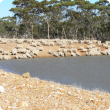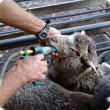Livestock & animals
The Department of Primary Industries and Regional Development supply chain support, research and development and rigorous biosecurity systems underpin the economic success of Western Australia’s livestock industries. In 2011/12, the WA livestock industries contributed 26% of the state’s agriculture, fisheries and forestry production, worth approximately $2 billion at the farm gate.
WA is a world leader in live exports, super fine wool production and dryland sheep and grain systems. Both cattle and sheep systems are focused on export markets to Asia and the Middle East. WA also has innovative, world-class integrated dairy and pork industries meeting local and South East Asian demand for safe, fresh milk and pork. The WA poultry industry is growing strongly as a result of increasing domestic consumption.
Global demand for high-quality, safe animal protein and products produced according to high animal welfare standards will continue to rise in coming years. Increasingly DAFWA will partner with industry -- locally, nationally and internationally -- in transformational business projects to capitalise on this demand.
Filter by search
Filter by topic
- (-) Remove Livestock species filter Livestock species
- (-) Remove Sheep filter Sheep
- Livestock management (118) Apply Livestock management filter
- Pests, weeds & diseases (46) Apply Pests, weeds & diseases filter
- Management & reproduction (44) Apply Management & reproduction filter
- Livestock health & diseases (44) Apply Livestock health & diseases filter
- Diseases (44) Apply Diseases filter
- Biosecurity & quarantine (43) Apply Biosecurity & quarantine filter
- Biosecurity (41) Apply Biosecurity filter
- Livestock biosecurity (35) Apply Livestock biosecurity filter
- Livestock disease surveillance (33) Apply Livestock disease surveillance filter
- Feeding & nutrition (26) Apply Feeding & nutrition filter
- Beef cattle (25) Apply Beef cattle filter
- Livestock parasites (19) Apply Livestock parasites filter
- Livestock research & development (17) Apply Livestock research & development filter
- Goats (15) Apply Goats filter
- Dairy cattle (15) Apply Dairy cattle filter
- Crops (13) Apply Crops filter
- Pastures (11) Apply Pastures filter
- Pigs (8) Apply Pigs filter
- Livestock movement & identification (8) Apply Livestock movement & identification filter
- Horses (8) Apply Horses filter
- Genetics & selection (8) Apply Genetics & selection filter
- Pasture management (7) Apply Pasture management filter
- Food, export & investment (7) Apply Food, export & investment filter
- Climate, land & water (6) Apply Climate, land & water filter
- Camelids (5) Apply Camelids filter
- Animal welfare (5) Apply Animal welfare filter
- Climate & weather (4) Apply Climate & weather filter
- State Barrier Fence (3) Apply State Barrier Fence filter
- Invasive species (3) Apply Invasive species filter
- Control methods (3) Apply Control methods filter
- Emergency animal disease preparedness (3) Apply Emergency animal disease preparedness filter
- Bees (3) Apply Bees filter
- Poultry & birds (2) Apply Poultry & birds filter
- Stockfeed (2) Apply Stockfeed filter
- Mechanical, physical and cultural (2) Apply Mechanical, physical and cultural filter
- Dry seasons and drought (2) Apply Dry seasons and drought filter
- Agricultural exports (2) Apply Agricultural exports filter
- Climate change (2) Apply Climate change filter
- Investment attraction (2) Apply Investment attraction filter
- Food & beverages (1) Apply Food & beverages filter
- Land use (1) Apply Land use filter
- Export services (1) Apply Export services filter
- Grains (1) Apply Grains filter
- Buy West Eat Best (1) Apply Buy West Eat Best filter
- Agribusiness Food & Trade (1) Apply Agribusiness Food & Trade filter
- Breeding & varieties (1) Apply Breeding & varieties filter
- Chemicals (1) Apply Chemicals filter

